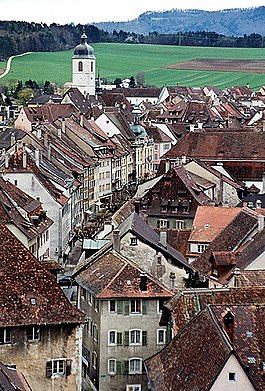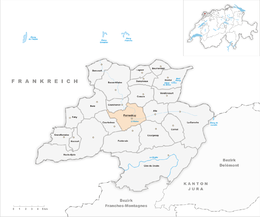Porrentruy
| Porrentruy | ||
|---|---|---|
 |
||
|
||
| Coordinates: 47°25′N 07°05′E / 47.417°N 7.083°ECoordinates: 47°25′N 07°05′E / 47.417°N 7.083°E | ||
| Country | Switzerland | |
| Canton | Jura | |
| District | Porrentruy | |
| Government | ||
| • Mayor |
Maire Guenat Gérard |
|
| Area | ||
| • Total | 14.75 km2 (5.70 sq mi) | |
| Elevation | 443 m (1,453 ft) | |
| Population (Dec 2015) | ||
| • Total | 6,829 | |
| • Density | 460/km2 (1,200/sq mi) | |
| Postal code | 2900 | |
| SFOS number | 6800 | |
| Surrounded by | Fontenais, Bressaucourt, Courtedoux, Bure, Courchavon, Coeuve, Alle, Courgenay | |
| Website |
www SFSO statistics |
|
Porrentruy (French pronunciation: [pɔʁɑ̃tʁɥi], Franc-Comtois: Poérreintru French pronunciation: [pweʁɛ̃tʁy], German: Pruntrut) is a Swiss municipality and seat of the district of the same name located in the canton of Jura.
Porrentruy is home to NLB team, HC Ajoie.
The first trace of human presence in Porrentruy is a mesolithic tool that was found in the back yard of the Hôtel-Dieu. Scattered, individual objects have also been found from the neolithic, the late Bronze Age and the Iron Age. The first known settlement in what became Porrentruy goes back to the Roman era. In 1983, the ruins of a Gallo-Roman temple were discovered in the cemetery on the north of town, and Roman coins were found there. Near the town, a kilometer long (0.6 mile) section of the Augst-Epomanduodurum (now Mandeure) Roman road was discovered.
In the back yard of the Hôtel-Dieu the charred remains of a building from the 10th or 11th century were discovered. However, the first historical mention of the name occurs in 1136 as Purrentru. The name presumably comes from the Latin pons Ragentrudis (Ragentrud bridge). Ragentrud was the wife of the Frankish King Dagobert I. The German form of the name, Pruntrut may have a separate etymology from Bruntrutum, which means an abundant spring.
...
Wikipedia



